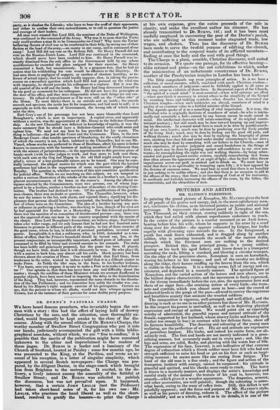DR. BURNS • S PASTORAL CHARGE.
WE have heard famous preachers, who invariably began the ser- mon with a story : this had the effect of laying hold of drowsy Christians by the ears, and the attention, once thoroughly ex- cited, would frequently be kept awake to the close of the dis- course. Along with the second edition of Dr. BURNS'S Charge, the worthy member of Swallow Street Congregation who put it into our hands, judiciously accompanied the gift with a little biblio- graphical anecdote, without which, we are " free to confess," it is possible that the merits of the publication might have remained unknown to the editor and unproclaimed to the readers of these pages. Dr. BURNS is a leader and a luminary of the Church of Scotland, located at Paisley : some few months ago, he was presented to the King, at the Pavilion, and wrote an ac- count of his reception, in a letter of singular simplicity, which appeared in several Scotch newspapers : the Charge was pre- pared, by the diligent Doctor, in the stage-coach which brought him from Brighton to the metropolis. It excited, in the de- livery, a lively interest among the assembly of the faithful at Swallow Street; and Dr. BURNS was solicited to publish the discourse, but was not prevailed upon. It happened, however, that a certain JOHN LESLIE (not the Professor) had taken short-hand notes of it, for his own use : Mr. LESLIE, who practises the hand liberal as well as the short- hand, resolved to gratify the hearers—to print the Charge at his own expense, give the entire proceeds of the sale in charity, and make the excellent author his almoner. He has already transmitted to Dr. BURNS, 101.; and it has been most usefully employed in succouring the poor of the Doctor's parish, who are suffering at this moment under stagnated trade, low wages, and cholera. Thus has the discourse of Dr. Bums been made to serve the twofold purpose of edifying the church, and contributing to the corporal wants of its afflicted members— feeding at once the body and the soul with good things. The Charge is a plain, sensible, Christian discourse, well suited to its occasion. We quote one passage, for its effective bearing— alike rational and pious—on the sad exhibitions to which, under the ministration of an unfortunate countryman of Dr. BURNS, another of the Presbyterian temples in London has been lent— The Bible comprehends our great principles of action. In it we have a collection of moral statutes, witch, combined with much Christian wisdom— with much soundness of judgment—must be faithfully applied to all cases as they may occur in violation of those laws. In the present aspect of the Church, " the spirit of a sound mind " is most essential—when wild opinions are afloat —when men think it necessary to attract others to the simplicity of the Gospel by sounding brass and tinkling cymbals—when disorder has desecrated our Christian temples—when such tendencies are abroad, soundness of mind is a quality of no common value in a faithful minister of the Gospel. The Apostle speaks of it as a something of vital importance. It is true, the individual who is originally destitute of soundness of mind—he who is intrin- sically and essentially a fool—cannot by any human means be made sound in mind. His intellectual character will retain something of its original consti- tutional tendency ; but still much may be done toward keeping up and improv- ing his discretion. In a sound mind there is much to be done by painful search- ing of our own hearts ; much may be done bypondering over the lively oracles of the living God ; much may be done by finding out the good old path, and walking therein ; much also may be done by studying the biography of-pious men, marking how they felt and acted under similar circumstances to our own ; much also may be done by consulting with our fathers in the Church,—men of more experience, of greater judgment and sound-headedness in the things of God; much may he done by guarding against self-confidence in our own nos- trums—by accomplishing the right way and walking therein—by being sobec- minded and guarded against erratic courses, carefully remembering that Satan does often assume the appearance of an angel of light—that he does often throw impediments across our path to mislead and to delude us. We must bear in mind that there is no spirituality in trampling upon folly ; it is best opposed by the dictates of common sense. We must bear in mind that there is no humility in just seeking to be unlike others ; and also that there is no occasion to add to the offence of the cross; that there is no honouring of God or of his testimony, in needlessly and foolishly increasing the offence of the cross, by the follies, the eccentricities, and the absurdities of men.



























 Previous page
Previous page